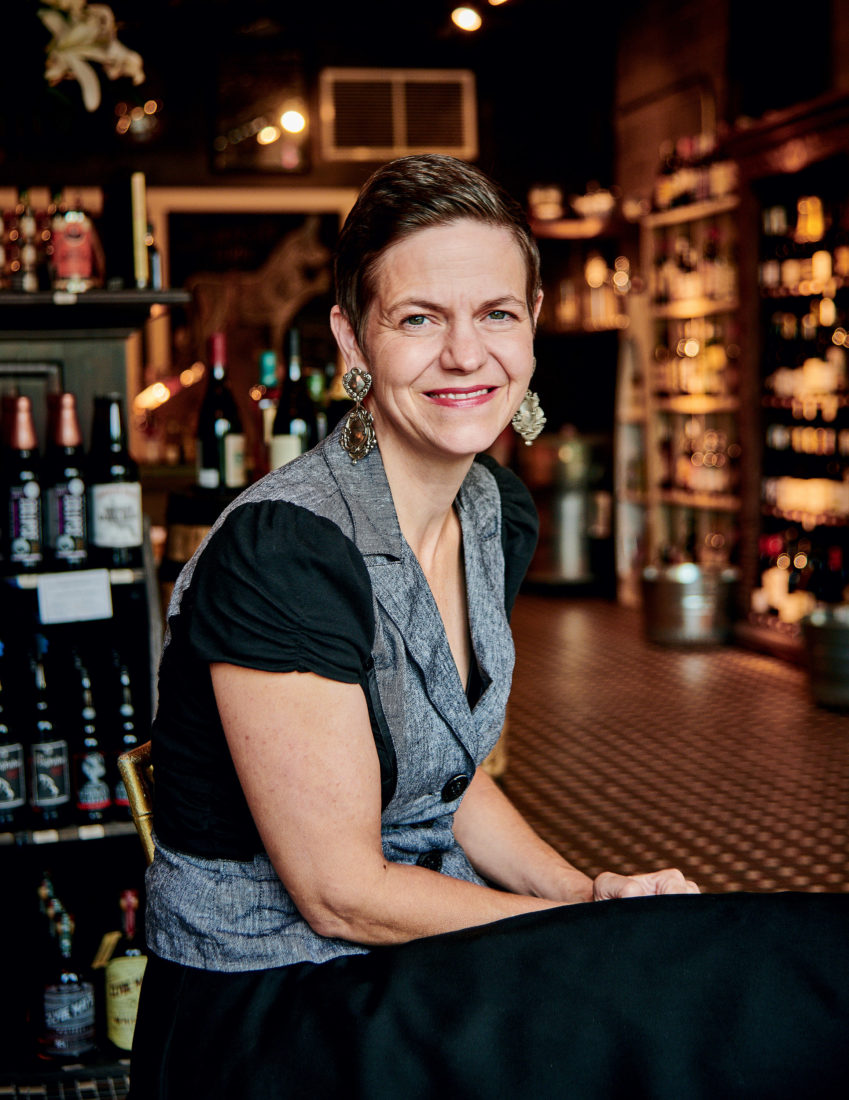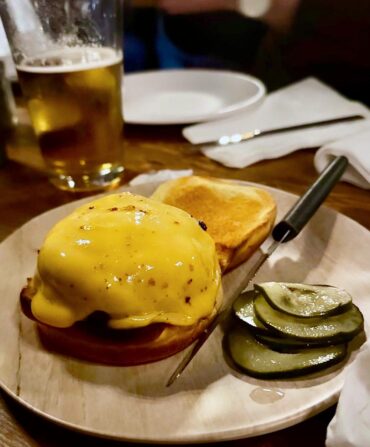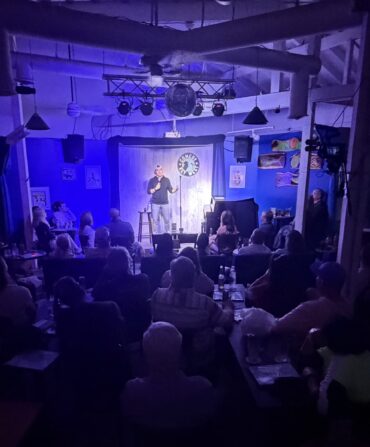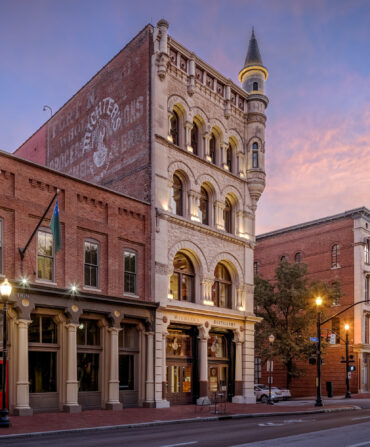Twenty-odd varieties of gin crowd a claw-foot bathtub. Lilies erupt from a vase on the counter. A crystal-draped chandelier spangles the tile-floored room. Atop a fountain stands a concrete statuette of a young boy with
water coursing from a body part that will remain unnamed. A brass tastevin cup hangs around his neck and a straw sombrero crowns his head.
When LeNell’s Beverage Boutique opened this past June—in a new cinder-block rectangle alongside an old Greek Revival three-story on the fringe of downtown Birmingham, Alabama—its owner, LeNell Camacho Santa Ana, stocked the shelves with obscure amari and keepsake bourbons and biodynamic and organic wines. She now holds cognac tastings that double as fund-raisers for TAKE Resource Center, a Birmingham nonprofit focused on serving transgender women of color. When she scores Velvet falernum, a Barbadian liqueur, she posts it to Instagram and the cocktail geeks flock.
Here in a neighborhood called Norwood, crosscut by the interstate, the future of the American package store comes into focus. In the hands of LeNell, a proselytizer of wine, spirits, and the spirits life, that future looks obsessive and playful and tastes flat out delicious.
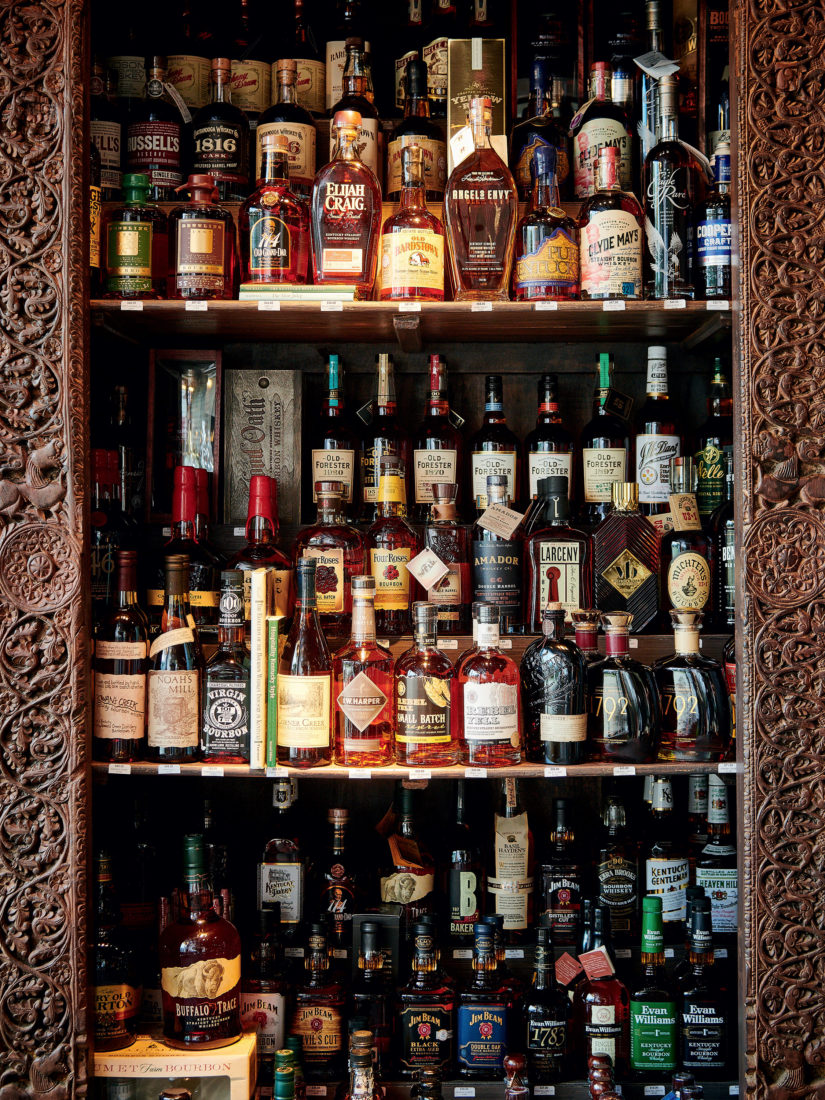
Photo: Stephen DeVries
The bourbon cabinet at LeNell’s Beverage Boutique.
Her career has been peripatetic. Born in Fort Payne, Alabama, where her mother worked in a mill, shaping cotton into socks, LeNell earned a master’s in public administration at the University of Alabama at Birmingham and had aimed to do nonprofit work on racial reconciliation. Instead, when her mother ceded custody of her fourteen-year-old sister to her, the woman who would become the most beloved liquor retailer in the nation applied for her first bartending job.
The men of Birmingham, who ran the industry back then, rejected her. They wouldn’t allow her to mix drinks. At a faux French bar that was vogue in 1990s Birmingham, she did what they demanded. She wore a cute outfit and smiled big for customers. Like many a Southerner, LeNell had to leave the South to find her path. She moved to New York City and took a job at Sherry-Lehmann, the storied wine and spirits merchant, where she studied the grape-growing regions of the world.
She opened the first LeNell’s in the Red Hook neighborhood of Brooklyn in 2003, when that now hip peninsula was desolate. Packs of stray dogs roamed the streets at night. Next door sat a junkyard stacked with cars. To advertise, she painted WINE + LIKKER above the glass storefront and stocked goods that her bartender friends couldn’t find at other retailers.
To make her name, LeNell left the South behind. But she couldn’t really quit the place. She wore overalls and cowboy boots. Her first employee was from Chattanooga. “People said that when we worked together, we twanged really hard,” LeNell remembers.
Back before the cool kids discovered ryes, LeNell sourced and bottled her own Red Hook Rye. The first whiskey was twenty-three years old and 134 proof. Produced for just two precious years, it’s now a sought-after bottle among collectors. Working the room in Red Hook, she befriended the folk who would lead the American whiskey renaissance. “Back when I was starving, she was one of the first who was interested in our product,” recalls Pappy Van Winkle proprietor Julian P. Van Winkle III. “She knew what the hell she was doing. And she believed in what we were
doing.” And then she was gone.
In 2009, after meeting a bartender from Mexico, she moved to La Paz, the capital of Baja California Sur, and got married. She and her husband, from whom LeNell is now divorced, taught cocktail classes and ran a bar called Casa Cóctel. They named their daughter, Damiana, after a shrub that grows profusely in Mexico and Texas and is used to flavor a liqueur.
At the time LeNell left Birmingham, she thought the city wasn’t ready to settle its racial and social differences. But returning in 2011, she saw the city in a fresh and hopeful way. And she committed to opening this new LeNell’s, though it would take a while.
She stepped back behind the bar, developing the opening cocktail list at the Southern-Mexican restaurant Little Don-
key and the signature Donkey’s Daddy, made with bourbon, tequila, hibiscus syrup, and lime. The same year, she bought her Norwood property cheap, in foreclosure, but her credit was shot after the divorce. To raise money, she sold her whiskey collection. Van Winkle drove down to cohost a private fund-raising dinner and brought a few of his own bottles to auction off.
She saved money on construction by managing the project herself. Damiana romped in a playpen as the building slowly took shape. And as the store neared completion, LeNell focused on how it would serve her new community.
Talking to friends, she kept using the words hope and healing. She knows those might sound like odd words to describe a liquor store. But we leave our homes in search of more than a bottle, she says. We seek an affirmation of humanity, to talk with a friend, or with a clerk or a bartender. “People don’t even realize today that they want those connections,” LeNell says. “I feel a calling to do more than sell wine and liquor here.”
LeNell’s Beverage Boutique is just a beginning. An all-day café comes next. Inspired by Bacchanal Wine, the New Orleans bar and restaurant that combines a sprawling backyard vibe with wine-by-the-bottle sales and live music, she plans to open the Copeland Café and Bar in 2020 in that now sagging Greek Revival mansion next door. It’s a good bet that, twenty years from now, when we look back on how package stores changed in the second and third decades of this century, we’ll talk about the LeNell’s compound, set hard by the interstate in a hopeful and healing place called Birmingham.


